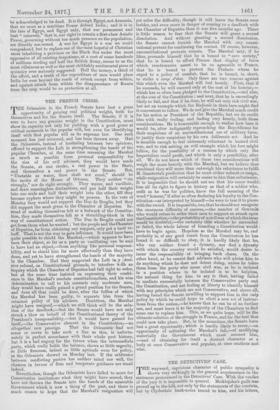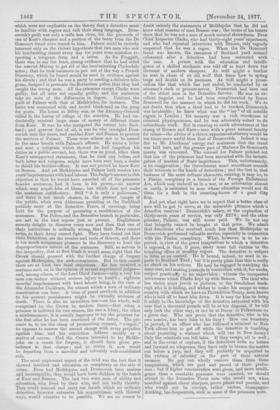THE DETECTIVES' CASE. T HE wayward, capricious character of public sympathy
is shown very strikingly in the general acquiescence in the sentences pronounced in the Detectives' Case. With the verdict of the jury it is impossible to quarrel. 111eiklejohn's guilt was proved up to the hilt, not only by the statements of the convicts, but by Clydesdale bank-notes traced to him, and his letters, which were not explicable on the theory that a detective must be familiar with rogues and talk their slang language. Drus- covich's guilt was only a trifle less clear, for the proceeds of one of Kurr's cheques and a portion of the booty from the De Goncourt fraud were traced to him. Palmer could be entirely innocent only on the violent hypothesis that two men who saw his handwriting almost every day for years were mistaken re- specting a telegram form and a letter. As for Froggatt, there was, to say the least, strong evidence that he had aided the convict Murray to get rid of the incriminating Clydesdale notes ; that he took measures to put out of the way a French Directory, which he feared would be used in evidence against his clients ; and that he was a party to sending a delusive tele- gram, designed to persuade the Rotterdam police that they had caught the wrong men. All the prisoners except Clarke were guilty, but all were not equally guilty, and the sentences take no note of the differences in degree. Contrast the guilt of Palmer with that of Meiklejohn, for instance. The latter was connected with and levied black-mail on the gang for years. His house at Derby was, as the Attorney-General called it, the haven of refuge of the convicts. He had un- doubtedly received large sums of money at different times from Kurr. It was he who instigated the retreat into Scot- land; and gravest fact of all, it was he who inveigled Drus- covich into the snare, and enabled Kurr and Benson to procure the services of Palmer. These were crimes not to be named in the same breath with Palmer's offence. He wrote a letter and sent a telegram which showed he had forgotten his duties as a public servant, but there was no proof, other than Kurr's unsupported statement, that he took any bribes, and both letter and telegram might have been sent from a desire to shield his brother-officer. It was not proved he knew Kurr or Beneon. And yet Meiklejohn and Palmer both receive two years' imprisonment with hard labour. The Judge's answer to this objection is that he would have awarded all of the prisoners heavier sentences, had it been in his power,—an answer which may acquit him of blame, but which does not make the sentences satisfactory. Still "it is only a policeman," and there is not much chance, in the present temper of the public, when even Aldermen presiding at the Guildhall publicly sneer at the Detective Force, of meetings being held for the purpose of procuring a modification of the sentences. The Police, and the Detective branch in particular, are not in the best repute just at present. Englishmen secretly delight to discover every now and then that one of their institutions is radically wrong, that their Navy cannot swim, or their Army cannot fight. They have found out that their Detectives are the cronies and tools of thieves, and there is too much momentary pleasure in the discovery to heed the disproportionate nature of the sentences. Still, so serious is the inequality, that at first blush it would seem right that the Crown should proceed with the further charge of forgery against Meiklejohn, the arch-conspirator. But to this course there are at least two fatal objections. He has received a sentence such as, in the opinion of several experienced judges— and, among others, of the Lord Chief Justice—only a very few men can endure without serious injury to health ; eighteen months' imprisonment with hard labour being, in the view of Sir Alexander Cockburn, the utmost which a man of ordinary constitution can bear. A term of penal servitude in addition to his present punishment might be virtually sentence of death. There is also an unwritten law—on the whole, well recognised by the Crown in modern tunes—that when a prisoner is indicted for two crimes, the one a felony, the other a misdemeanour, it is usually improper to try the prisoner for the first after he has been convicted of the latter. The pri- soner is, to use the slang of prosecuting counsel, "winged ;" he appears to answer the second charge with every prejudice against him, and his conviction follows usually as a matter of course. Had the Crown intended to try Meikle- John on a count for forgery, it should have given pre- cedence to that charge ; and to revive it now would be departing from a merciful and tolerably well-established rule.
The most unpleasant aspect of the trial was the fact that it showed intellect and education so completely on the side of crime. Even had Meiklejohn and Druscovich been zealous and incorruptible, they would have been children in the hands of Kurr and Benson. The last two were men of ability and education, who lived by their wits, and not badly thereby. They could concoct and carry out frauds which no ordinary detective, however extensive his acquaintance 'with thieves' ways, would conceive to be possible. We see no reason to doubt entirely the statements of Meiklejohn that he did not know what manner of man Benson was ; the terms of his letters show that he was not a man of much natural shrewdness. Even Chief Inspector Clarke, who had thirty-eight years' experience, and who had repeated interviews with Benson, only vaguely suspected that he was a rogue. When the De Goncourt fraud was known, the resources of Scotland yard seemed exhausted after a detective had been entrusted with the case. A person with the education and intelli- gence of a skilled mechanic was told off to hunt down the cleverest of modern sharpers. As well might a lurcher be sent in chase of an old wolf that knew how to spring traps and double on its pursuers. As well might a prose- cution like that which has just ended, be conducted by an attorney's clerk or process-server. Druscovich had been one of the ablest men in the Detective Service. He was an ex- cellent linguist, and he had been complimented by Baron Bramwell for the manner in which he did his work. We do not doubt that when a thief had to be tracked, Druscovich was invaluable ; he knew what was the " lay " of all notable rogues in London ; his memory was a rich storehouse of criminal physiognomies, and he was admirably suited to do subordinate work. But in running to earth adventurers of the stamp of Benson and Kurr—men with a great natural faoulty for crime—the advice of a clever, experienced attorney would be ten times more useful than that of Druscovich. Indeed it was due to Mr. Abrahams' energy and acuteness that the fraud was laid bare, and the greater part of Madame De Goncourt's money was recovered. The counsel for Palmer pointed out that one of the prisoners had been entrusted with the investi- gation of matters of State importance. This, unfortunately, is no exaggeration ; the Government must sometimes commit their interests to the hands of detectives ; and the fact is, that business of the most delicate character, relating, it may be, to a Fenian conspiracy or a breach of the Foreign Enlistment Act, which may embroil us in a war, or an arbitration almost as costly, is entrusted to men whose education would not fit them for a desk in the counting-house of a good City firm.
And yet what right have we to expect that a better class of men will be got to serve, at the miserable pittance which a detective receives ? Druscovich's salary, at the expiration of thirty-seven years of service, was only £276; and the other prisoner, Palmer, was still worse paid. We do not say that integrity cannot be bought at that price. We admit that detectives who received much Tess than Meiklejohn or Druscovich performed valuable service, especially in connection with the Fenian conspiracy. What, however, is to be ex- pected, in view of the grave temptations to which a detective is exposed, is that, if poor, many must fall victims to the tempting offers of wealthy rogues. The detective is subject to little or no control. He is bound, indeed, to send in re- ports to Scotland Yard ; but it is pretty plain that this is really no check on his actions. He may be engaged in watching the same case, and making journeys in connection with it, for weeks, subject practically to no supervision ; witness the unreported intercourse which Clarke kept up with Denson. The thief who has stolen some jewels or pictures, or the fraudulent bank- rupt who is in hiding, and wishes to make his escape to some country with which we have no Extradition Treaty, soon knows who is told off to hunt him down. It is easy for him to bring it safely to the knowledge of the detective entrusted with his case that a thousand pounds will be at his disposal, if he will only look the other way, or not be at Dover or Folkestone on a given day. Who can prove that the detective, who is his own master, has been false to his duty ? How can treachery be proved, if an officer who has followed a criminal to New York allows him to get off while the detective is fumbling about procuring a warrant which will run in New Jersey ? Only the criminals can tell tales. If they escape, all is well ; and in the event of capture, if the detectives write no letters and forward no telegrams, they have only to brazen the matter out before a jury, and they will probably be acquitted as the victims of calumny on the part of their natural enemies. No pay can wholly remove them from these temptations, which are part and parcel of their profes- sion; but if higher remuneration were given, and more intelli- gence than a constable possesses were exacted, we should attract to the Detective Force men who would not, when matched against clever sharpers, prove pliant and puerile, and who would not be corrupt, rather useless, champagne- drinking, bar-frequenters, such as some of the prisoners were.







































 Previous page
Previous page